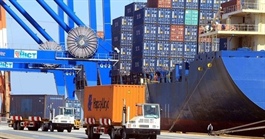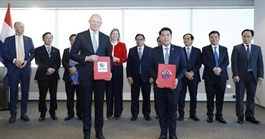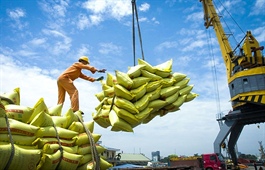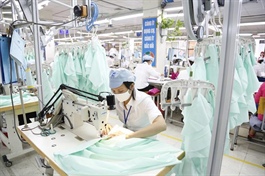Uphill task for next year’s trade goals
Uphill task for next year’s trade goals
An 11-month large trade surplus has mirrored an expansion of both exports and imports, but lingering risks are making it difficult for the country to hit its trade goals next year.

The Ministry of Industry and Trade (MoIT) reported that the economy’s total 11-month goods export-import turnover is estimated to be in $673.82 billion – up 11.8 per cent on-year. The export turnover stood at $342.21 billion – up 13.4 per cent, and the import turnover sat at $331.61 billion – up 10.1 per cent. There has been a trade surplus of $10.6 billion.
Vietnam has consecutively recorded a trade surplus, at $809 million in Q1, $1.28 billion over the first six months of 2022, $5.49 billion over eight months, $5.7 billion in nine months, and $9.4 billion covering the first 10 months of the year.
The government is expecting that for the entire year, the total export turnover will be $368 billion – up 9.46 per cent against 2021, and far higher than the target of $329.9 billion set in early this year. Meanwhile, the total import turnover will be around $$367 billion, higher than the goal of $330.9 billion set in early this year. All are thanks to consumers’ high spending, and tax reduction and removal under free trade agreement commitments. This will mean a trade surplus of $1 billion for 2022, quite contrary to a trade deficit of $1 billion expected earlier this year.
From the start of the year to the end of November, up to 35 items had an export turnover of more than $1 billion – accounting for 93.7 per cent of the country’s total export turnover. This included eight items with an export turnover of over $10 billion – holding 70.1 per cent of the total.
Industrial items with big export value include mobile phones and spare parts ($55.37 billion – up 6.6 per cent on-year); and computers, electronics, and spare parts ($50.52 billion – up 11 per cent). Samsung is estimated to create more than 90 per cent of Vietnam’s total export values of electronics and mobile phones.
Other items with big export value also include machinery and equipment ($41.97 billion, up 23.3 per cent on-year); garments and textiles ($34.53 billion, 18.5 per cent); and footwear ($22.1 billion, 49.9 per cent), and wood and wooden products ($14.6 billion, 9 per cent).
The government has set a target that in 2023, Vietnam’s total goods export-import value will be about $795 billion, up about 8 per cent against this year. In which, the export turnover will be $398 billion – up over 8 per cent on-year. The trade surplus will stay at about $1 billion.
However, many experts said that these targets may be unreachable due to various risks lingering and able to affect Vietnam’s trade.
According to the World Bank, global growth is expected to slump from 5.7 per cent in 2021 to 2.9 per cent in 2022 - significantly lower than 4.1 per cent that was anticipated in January.
“It is expected to hover around that pace over 2023-2024, as the war in Ukraine disrupts activity, investment, and trade in the near term, pent-up demand fades, and fiscal and monetary policy accommodation is withdrawn,” said the World Bank.
“Growth in advanced economies is projected to sharply decelerate from 5.1 per cent in 2021 to 2.6 per cent in 2022, 1.2 percentage point below projections in January. Growth is expected to further moderate to 2.2 per cent in 2023, largely reflecting the further unwinding of the fiscal and monetary policy support provided during the pandemic.”
Risks include growth slowdown or stagflation in main export markets, further commodity price shocks, continued disruption of global supply chains, or the emergence of new COVID-19 variants. Domestic challenges include continued labour shortages, the risk of higher inflation, and heightened financial sector risks, the World Bank warned.
The government has required the MoIT to find out solutions to boost exports and closely control imports, and take advantages of commitments in signed free trade agreements in order to expand export markets.
The MoIT is ordered to direct Vietnam’s trade offices overseas to seek more information and demands from the markets where they are located to timely provide consultancy for the government and the prime minister on how to boost exports to these markets.
























